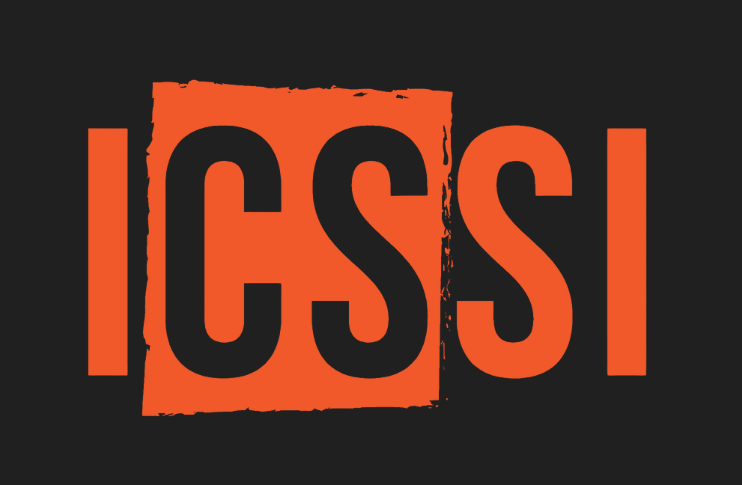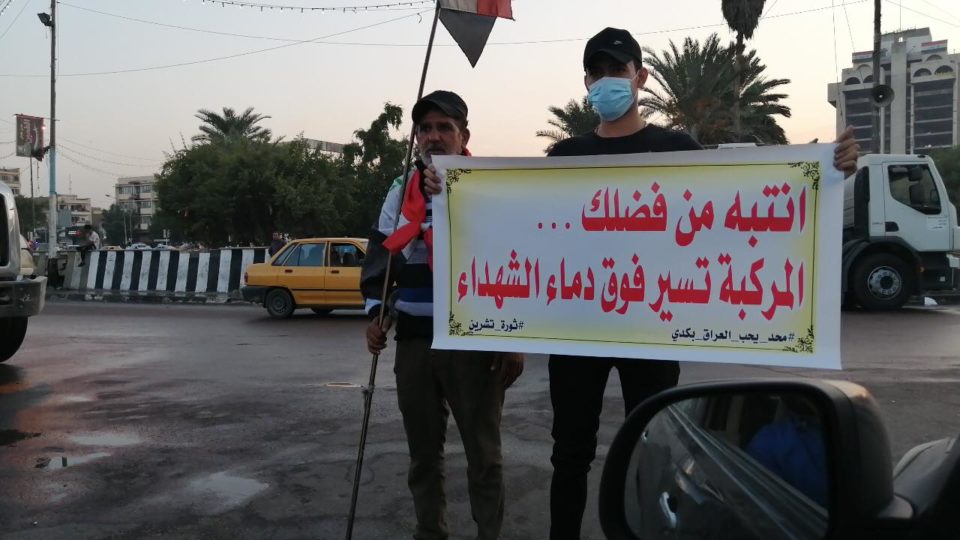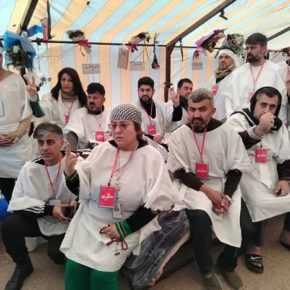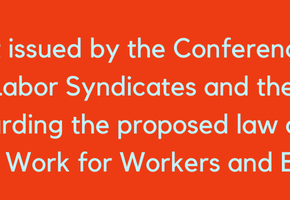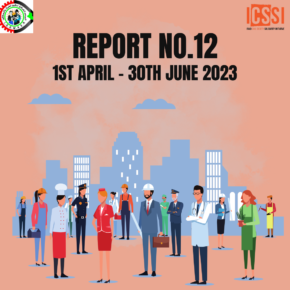After the Government Ejects Protesters from Tahrir Square, New Protests Erupt Demanding Payment of Government Employees’ Salaries
“Paintings and pictures of martyrs and revolutionary slogans” are all that remain in Baghdad’s Tahrir Square, after the government decided to forcibly reopen Iraq’s most prominent protest square and the surrounding streets and bridges. Authorities removed the tents of the protesters who have been demonstrating for more than a year, but have not answered their foremost demand: to identify and hold accountable those responsible for the killing of more than 700 protesters, the wounding of tens of thousands more, and the disappearance and continued absence of many other activists. After a year of the Jumhuriya Bridge, which links Tahrir Square and the fortified Green Zone, being closed, the first vehicle began to pass over it on Saturday evening. This coincided with the opening of the roads leading to Tahrir Square from all sides (toward Nassir Square and Al-Tayaran to the south, and toward Al-Khalani to the north).
Security forces and the municipal workers of Baghdad Municipality then began to take away the remaining protesters’ tents and to clean the square and surrounding streets, including “Tahrir Tunnel” that used to be a “free wall” where the demonstrators posted pictures of their dead friends, images of the repression their protest movement encountered, as well as drawings and slogans supporting their revolution. “Don’t touch the graffiti,” pleaded Alaa Maan, Baghdad’s Mayor, In a statement to the press, he called the expressions of the demonstrators in the Tahrir Tunnel “a shining page in the history of the new Iraq” and “documentation of important events that have contributed to the country’s renaissance”.
It was only a few hours after the demonstrators’ tents were removed before protests resumed in Tahrir Square. On Sunday 1st November, activists gathered under the Freedom Monument and shouted criticism of Iran and the United States of America. The demonstrators also carried pictures of the victims of the protests. They pledged the continuation of their movement until their demands are met, most notably holding the “murderers” accountable, complete information about the fate of those people who were disappeared or abducted, and holding those responsible for the violence fully accountable. The demonstrators’ and activists’ feelings of sadness and anger grew as they watched vehicles breaking the boundaries of an area where thousands of young victims had, for months, given their lives for the future of their country. Some stood to warn drivers that the wheels of their cars were crushing the blood of their colleagues. Yet, activists said that breaking up the sit-in doesn’t “ever” mean ending the protests. Exactly the opposite, they vowed to continue their movements until the demands of the “uprising”, as they have consistently stated them, are met.
Clashes between Iraqi security forces and protesters resumed in the southern province of Basra, where security forces tried to disperse demonstrators who rejected attempts by Iraqi authorities to end that province’s sit-in in Bahria Square. Activists in other southern provinces also protested the authorities’ attempted use of force to end the protests. Sources said that the security forces blocked a number of main roads in Basra, especially those leading to Bahria Square and the local government building in Basra. They explained that the demonstration extended to the area of Jubaila, near Bahria Square, where security forces stopped the movement of the cars after widespread activities by the demonstrators. Activists on social media documented on videos what they said were the Iraqi security forces firing live bullets at protesters. “The security forces met us with live bullets, batons, sticks, and shot directly at us, because we wanted to continue our demonstrations after they insisted we withdraw from the squares,” activists reported.
On Sunday evening, a demonstration in support of the Basra sit-in took place at the Hbubi sit-in in the southern city of Nasiriya (Ziqar governorate center). The protestors confirmed their solidarity with the Basra protesters who were opposing attempts by security forces to end the demonstrations in Basra by force. They pointed out that peaceful protests in Nasiriyah are continuing and will not end until all their demands are met, most importantly trials of the killers of demonstrators, and accountability for government corruption. Hundreds of people demonstrated in the southern Iraqi city of Samawah (Muthana governorate center) in support of Basra’s protests. And in Wasit province in the south, a demonstration was also held in the provincial center (Al- Kut province) in support of the Basra protests. All the demonstrators denounced the tactics of the Iraqi forces to break up the Basra demonstrations.
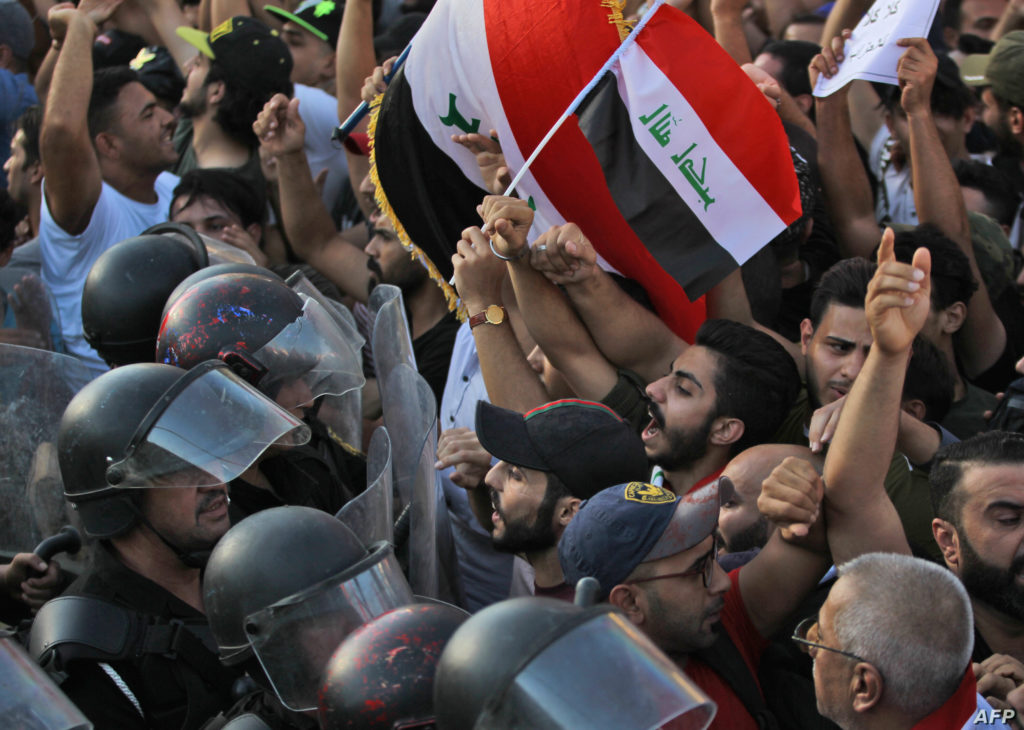
But at the same time, with raging resentment, Iraqi government employees staged their own demonstrations to protest against non-payment of their salaries, which has been delayed for weeks. Government employees from Baghdad, Wasit, Basra, Dhi Qar, Nasiriyah, Muthanna and Karbala staged demonstrations. They stood in front of their offices carrying signs with slogans demanding the payment of employees’ salaries, but deny that they have any larger political aims. In Baghdad, employees demonstrated in front of the finance ministry. According to a source in the finance ministry who commented on the employee protests, the national government, which is suffering from a severe lack of liquidity, is considering action by the House of Representatives on a fiscal deficit financing law to restart paying employees’ salaries. “The government needs about two trillion dinars to pay salaries since last October, because oil revenues do not equal the amount of the salaries owed,” the source said. There will be no salaries paid without passage of the fiscal deficit financing law by the House of Representatives. “If the law is passed, salaries will be paid directly,” the source said. The delay in the payment of salaries to employees for more than 50 days has posed a major threat to security and community peace.
For the second time this year, Cabinet members have had request an emergency financing law to cover deficit spending through the end of 2020. They sought and received parliamentary approval for emergency loan of $10 billion. This stopgap solution will cover monthly expenses for government salaries and operating expenses, but does nothing to address the underlying reasons for the fiscal crisis. One possibly hopeful development is the formation of an international financial alliance to help Iraq retrieve $150 billion in funds stolen from the country since 2003.
Leaders of the trade union movement in Iraq, however, paint a dire picture of the years ahead, predicting a five-year recession. In activities coordinated through the Solidarity Center in Baghdad the unions are attempting to make increasing Iraqis’ economic and social rights central to government reform. Wesam Chaseb, who has managed the Center’s work with unions since 2011, insists that unions must fight for programs to reduce the social shock of the impending recession. In Basra, center of the oil industry, unemployment already exceeds 40% and will likely climb higher. Iraq is now engaged in discussions with the World Bank to seek financial relief in 2021. Chaseb is deeply concerned about the price that Iraqi citizens will pay if austerity and structural readjustment policies are forced on Iraq without concern for their human costs.
